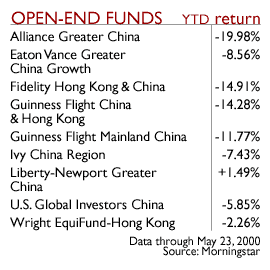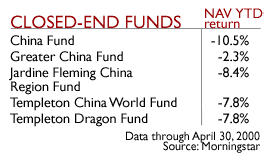|
Prospects for China funds
|
 |
May 25, 2000: 11:29 a.m. ET
Trade deals are 'long-term positive' for investors and Beijing, but should you buy?
By Staff Writer Jeanne Sahadi
|
NEW YORK (CNNfn) - With the "trade" wind at China's back, it may seem investment prospects in that country are brighter than ever.
Now that the U.S. House of Representatives has cleared the way for trade barriers with Beijing to fall, you might be wondering if you should add some China exposure to your portfolio.
But a quick review of past events shows major international agreements don't always have a positive impact - or indeed much influence at all -- on market performance.
Remember the North American Free Trade Agreement, or NAFTA, which opened up trade with Mexico in 1993? It didn't help Latin American stocks, which subsequently got hammered by Mexico's peso crisis and other economic downturns in the region.
 Or how about the breakthrough peace agreement between Israelis and Palestinians, sealed with a handshake on the White House lawn that same year? That failed to buoy the closed-end First Israel Fund, which plummeted 35 percent in 1994. Or how about the breakthrough peace agreement between Israelis and Palestinians, sealed with a handshake on the White House lawn that same year? That failed to buoy the closed-end First Israel Fund, which plummeted 35 percent in 1994.
The lesson is clear: "It's always chancy to buy a fund based largely on a political event," said international fund analyst Gregg Wolper of Morningstar.
That's because other factors -- such as rising interest rates, regional economic problems and political wrangling -- easily can overshadow any positive investor sentiment resulting from such agreements, Wolper said.
And there's no ignoring Wall Street's persistent influence. Volatility and the price decline on the Nasdaq has had a decidedly negative impact on Asian markets in April and May.
Most China funds have sustained losses so far this year; some of them have suffered double-digit percentage losses.
Trade deal a 'long-term positive'
If you believe markets are efficient, chances are fund investors have already discounted China's latest trade victories, experts said.
In addition to winning approval Wednesday from the U.S. House of Representatives to grant China permanent normalized trade relations with the United States, Beijing recently reached a trade pact with the European Union, clearing one of the last hurdles for its admission into the World Trade Organization.
It's possible, however, you may see an immediate spike, Wolper said. That's what happened in November when the United States signed a trade pact with China.
 But that initial jump, if it comes, may be brief. Soon after the U.S.-China pact cleared last fall, "investors pulled back a bit" due to skepticism about the competitiveness of certain industries in China, said Douglas Beck, director of international equity funds research for Merrill Lynch. And most recently, he added, "individuals have jumped into their fox holes," wary of the risk. But that initial jump, if it comes, may be brief. Soon after the U.S.-China pact cleared last fall, "investors pulled back a bit" due to skepticism about the competitiveness of certain industries in China, said Douglas Beck, director of international equity funds research for Merrill Lynch. And most recently, he added, "individuals have jumped into their fox holes," wary of the risk.
Nevertheless, he characterized the breakdown in trade barriers as "a long-term positive" for investors and for China. "There's definitely opportunity there ... But at the same time, we're talking about a very large economy. You don't make a change and expect a drastic turn," he said.
Need for more transparency
U.S. institutional investors are continuing to eye China's investment potential, but most want to see more reform in company management and greater accounting transparency before they place heavy bets, experts said.
Kunal Kapoor, also an international fund analyst at Morningstar, said one fund he covers -- Fidelity Hong Kong & China -- is a testament to the general apathy about investing in mainland China, since most of the fund's holdings are in Hong Kong.
The opportunity to get into China has existed for a few years, he noted. "But most people have preferred not to."
Is China for you?
Many fund experts don't recommend the average U.S. investor hop into a country fund, especially in an emerging market such as China. The risks are too high and the diversification too low.
People for whom such a fund might make a good investment are those who have specialized knowledge of the country and are willing to absorb the risk, Wolper said.
If you fall into this category, you still want to pick wisely.
The closed-end China funds -- those that trade like stocks, with prices rising or falling based on investor sentiment -- have been trading near 10-year historical lows, Beck noted, and all are well managed.
If he had to choose, he thinks the growth-oriented Greater China Fund, -- which Merrill Lynch has rated "accumulate" -- might make a good bet. He said that, as its name implies, it has greater flexibility to invest not only in mainland China but also Hong Kong and Taiwan, whose market has held up comparatively well.
For a value bet, Beck notes that Templeton Dragon Fund has a couple of things going for it. One is emerging markets guru Mark Mobius. The second is a growing appeal in value plays, amid expectations that Chinese exports will slow somewhat and earnings will become a more prevalent barometer for investment.
If you want an open-end fund, Wolper recommends sticking with those that have the longest track records, such as the Eaton Vance Greater China Growth Fund, Fidelity Hong Kong & China Fund or the Guinness Flight China & Hong Kong Fund.
But for those investors looking for long-term exposure to the international markets, including a taste of China, "You're better off buying a broader emerging markets fund," Wolper said. 
|
|
|
|
|
 |

|

